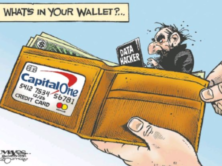The Guardian's investigations editor, David Leigh, seems to have admitted to phone hacking five years ago. (Credit: the Guardian, screenshot)
The Guardian has led the coverage and broken many of the stories in the News of the World phone hacking scandal. But did the Guardian hack phones too?
But, the Village Voice reported that the Guardian’s investigations editor David Leigh admitted five years ago in a story to breaking into someone’s voicemail and listening to messages.
The phone hacking admission was found in a 2006 article by Leigh for the Guardian. In that 2006 article, Leigh wrote about former News of the World reporter Clive Goodman’s admission of phone hacking. Leigh wrote:
“I’ve used some of those questionable methods myself over the years. I, too, once listened to the mobile phone messages of a corrupt arms company executive – the crime similar to that for which Goodman now faces the prospect of jail. The trick was a simple one: the businessman in question had inadvertently left his pin code on a print-out and all that was needed was to dial straight into his voicemail.
“There is certainly a voyeuristic thrill in hearing another person’s private messages. But unlike Goodman, I was not interested in witless tittle-tattle about the royal family. I was looking for evidence of bribery and corruption. And unlike the News of the World, I was not paying a private detective to routinely help me with circulation-boosting snippets.”
The Daily Mail reported that Leigh “is set to be questioned by police” over the admission, and added that a spokesperson for the newspaper commented that Leigh “had been open and transparent in writing about his use of phone hacking and ‘has never attempted to conceal it or cover it up.”
However, a spokesperson for the Guardian has denied phone hacking. The spokesperson is quoted as telling the Metro that “the Guardian does not and has not authorised phone hacking.”
The Toronto Star reported that Leigh “is on holiday until Aug. 22” but that the Guardian issued a statement to the Star that reads:
“This is not a new story. It is based on a 5-year-old article written by David Leigh. He has never attempted to conceal it or cover it up.”
Forbes’ Jeff Bercovici reported that the Guardian added that the five-year-old admission is “an example of an award-winning journalist being totally open about a story that was overwhelmingly in the public interest.” Bercovici noted that Poynter’s Kelly McBride rejected the “defense that what he did was permissible because it was in the public interest and he was transparent about it after the fact.”
McBride noted that using “the ends justify the means” rationale, “it is a subjective call.”
iMediaEthics has written to the Guardian for comment and will update with any response.
Paul McCartney Claims the Mirror Hacked Him
Paul McCartney claimed his phone has been hacked as well and called the hacking “a horrendous violation of privacy,” the Toronto Star reported. Time noted that McCartney’s claims are against the Daily Mirror.
News Corp-owned Wall Street Journal reported that “About 35 privacy-invasion lawsuits have been filed against News of the World.”
UPDATE: 08/08/2011 12:09 PM EST: The Guardian responded to iMediaEthics’ e-mail with the following statement. Read in full below:
“This is not a new story. It is based on a five year old article written by David Leigh for MediaGuardian in 2006 regarding the exposure of major corruption and bribery. He wrote about it openly and transparently and has never attempted to conceal it or cover it up. In fact the BBC has twice reported it in recent months based on David’s own account [http://www.bbc.co.uk/news/uk-13092573].
“The piece itself was a discussion about what journalistic behaviour is justified by the public interest. This is a perfectly legitimate question that will be an important part of the Leveson inquiry. In recent weeks, similar articles have been written by the Director General of the BBC, Mark Thompson, and the editor of the Sunday Times, John Witherow. This is an example of an award-winning journalist being totally open about a story that was overwhelmingly in the public interest. We are sure that David Leigh would be only too happy to share this with the Leveson inquiry.
“The Guardian does not authorise and has not authorised phone hacking. We will be providing all information necessary within the proper context of the judicial inquiry set up by Lord Leveson and given that his inquiry is now underway it would not be appropriate to make further comment.”





Comments Terms and Conditions